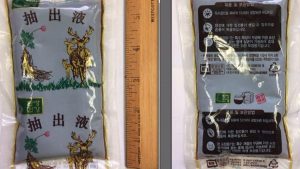As I sip tea and watch the Pacific waves roll into Coff’s Harbour from our 13th floor beachside apartment, resting for the next-of-so-far-12 hours on the ice at a weekend hockey camp we arranged for 36 kids from Brisbane, I ask myself: who the fuck drinks tea from deer antlers?
Lots of North Americans make lots of money selling deer antler velvet to southeast Asians, especially Chinese, who value the ingredient in traditional herbal medicine.
Until it gives someone botulism.
Public health officials consider a single case of botulism a public health emergency, because it might foretell a larger outbreak, according to the U.S. Centers for Disease Control (CDC).
One adult in Orange County, California has a confirmed case of botulism, and another has a suspected case. Health types suggest the botulism illnesses may be connected with drinking deer antler tea obtained in March.
According to ProMed, velvet antler (<https://en.wikipedia.org/wiki/Velvet_antler>) “is used as a drug in traditional Chinese medicine (TCM) that classifies many
similar substances from a variety of species under the simplified
Chinese name pinyin Lu Rong and the pharmaceutical name Cervi Cornu
Pantorichum. The 2 common species used within the TCM system are Sika
Deer and Red Deer. Within the TCM system it is prescribed by a doctor
to a patient in the use to treat yang deficiency syndromes. In Asia,
velvet antler is dried and sold as slices or powdered. The powder or
slices are then boiled in water, usually with other herbs and
ingredients, and consumed as a medicinal soup.
Velvet antler in the form of deer antler spray has been at the center
of multiple controversies with professional sports leagues and famous
athletes allegedly using it for injury recovery and performance
enhancement purposes. In mid-2011 a National Football League (NFL)
player successfully sued a deer antler velvet spray manufacturer for
testing positive for methyltestosterone in 2009 for a total amount of
5.4 million.[19][20] In August 2011, Major League Baseball (MLB) added
deer antler spray to their list of prohibited items because it
contains “potentially contaminated nutritional supplements.”
On January 30, 2013, a professional PGA Tour golfer was caught unaware
and openly admitted to the personal use of deer antler spray which
contained a banned substance at the time. A week later the World
Anti-Doping Agency (WADA) lifted the ban on deer antler spray, but
with urgency, “Deer Antler Velvet Spray may contain IGF-1
(Insulin-like Growth Factor -1) and WADA recommends therefore that
athletes be extremely vigilant with this supplement because it could
lead to a positive test.” The consensus opinion of leading
endocrinologists concerning any purported claims and benefits “is
simply that there is far too little of the substance in even the
purest forms of the spray to make any difference,” and “there is no
medically valid way to deliver IGF-1 orally or in a spray.”


